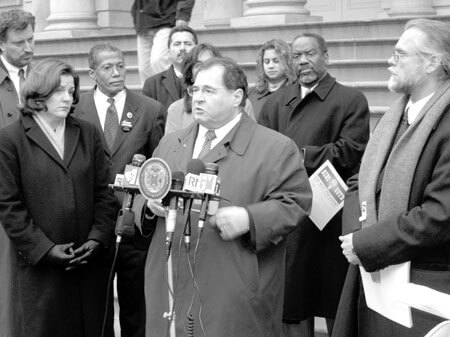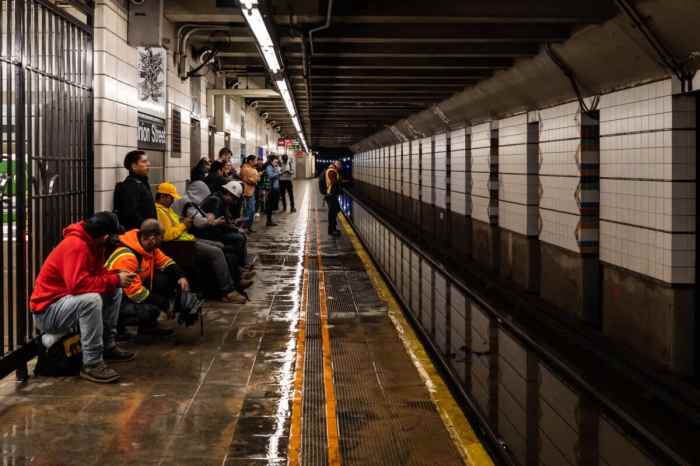e
World AIDS Day at City Hall
Elected officials, including City Councilmember Christine Quinn (l) and U.S. Rep. Jerrold Nadler (at podium) are criticizing Mayor Bloomberg’s new AIDS commission. (PHOTO BY: Michael Kink, Housing Works)
Noting that HIV prevention in New York City is not working, Mayor Michael R. Bloomberg launched a 20-member commission that will advise him on AIDS issues.
“This is particularly troubling because we know how to stop the spread of HIV,” Bloomberg said at a December 1 event at Gracie Mansion marking World AIDS Day. “We know what to do. We are doing a lousy job at prevention.”
The commission will be co-chaired by Dennis Walcott, a deputy mayor, and Dr. Thomas R. Frieden, the city’s health commissioner who both report to the mayor. Bloomberg meets with his senior City Hall staff every day and his commissioners every week. Other senior city employees on the commission are Verna Eggleston, commissioner of the Human Resources Administration with jurisdiction over the HIV-AIDS Services Administration (HASA), and Dr. Benjamin Chu, president of the city’s Health and Hospitals Corporation.
The commission’s composition is getting generally negative reviews.
It has no one representing black gay men, a population that has been particularly hard hit by HIV, according to Gary English, executive director of People of Color in Crisis, a Brooklyn-based AIDS service group.
“It looks like something very interesting, but I’m wondering where the black gay voice is in the process,” he said. “That is the first thing they need to correct and very soon.”
One commissioner, Frank J. Oldham, Jr., is both black and gay, but he is also the citywide coordinator for AIDS policy and a city health department employee.
“He works for the city and I don’t expect him to have a black gay perspective when he is working,” English said. “How can the city go forward without having a voice that is so heavily impacted?”
City Councilmember Christine Quinn, the Democrat representing Chelsea and Greenwich Village who chairs the council’s health committee, said the commission was not “very racially or ethnically diverse” nor did it draw its members from all five boroughs.
Quinn pointed to recent run-ins the Bloomberg administration has had with AIDS activists over its proposals to privatize HASA services or to cut $5 million from the city budget for HIV prevention and AIDS services in communities of color. She said the Republican mayor was merely trying to appear responsive.
“I think this commission is just a spin mechanism, a way to cool community concerns about the Bloomberg administration’s efforts on HIV and AIDS,” Quinn said.
Regina R. Quattrochi, executive director of Bailey House, an AIDS housing group, was angered when Bloomberg launched a commission on homelessness in late November that did not include any groups that are significantly involved in providing housing for people with AIDS. This latest AIDS commission also does not include such groups, according to Quattrochi.
“I was appalled that there was no one representing the HIV-AIDS housing community,” she said.
Quattrochi said that over 30,000 people with AIDS receive housing assistance through HASA.
“If that’s not reason enough to have an HIV-AIDS housing provider on the commission then I don’t know what is,” she said.
Like Quinn, Quattrochi speculated that the commission’s members may have been selected from those AIDS groups that have been less aggressive with the administration.
“Among the advocates, the housing advocates have been in the forefront of challenging this administration,” Quattrochi said. “I don’t understand. Was it an oversight or was it an intentional decision to not have those folks who are challenging on the panel?”
Housing Works, an AIDS service organization that is known for its aggressive advocacy, has battled successive mayors in the courts and on the streets. Bloomberg has not been spared and, most recently, the group objected when he moved the Office of AIDS Policy from reporting to Walcott to under Frieden. That move was seen as a cut in the office’s influence.
Housing Works is also charging that the Bloomberg administration is using federal housing dollars to pay HASA workers.
“Given that we are into the third decade of AIDS and HIV having a commission to study AIDS and HIV in New York City is a waste of time, a bureaucratic scam and it won’t work,” said Keith Cylar, a Housing Works co-president. “What this mayor needs to do is provide leadership, money for people living with AIDS, he needs to stop taking money that should be used to fund housing and instead pay the salaries of city workers, and he needs to re-create the independent Mayor’s Office of AIDS Policy.”
The reaction to the commission may also reflect the poor relations among a Republican mayor, the Democratic City Council, and AIDS groups that have long battled City Hall.
Quinn said Bloomberg “does deserve credit” for funding needle exchange programs in the city, but that was the only positive effort she cited.
“If you look at the past two years, Mayor Bloomberg doesn’t have that stellar a record on HIV,” she said. “You have to earn goodwill. He hasn’t acted cooperatively.”
Paraphrasing Bloomberg’s response to a question about the commission at his December 1 press conference, Jordan Barowitz, a Bloomberg spokesperson, said, “This is an excellent commission that represents the best and the brightest as well as representing a diversity of opinion, approach and experience in fighting HIV and AIDS.”
The first meeting of the commission that will take place on December 16 at Gracie Mansion will be closed to the public. The mayor’s office and the department of health did not respond to questions about whether subsequent meetings would also be closed to the public.
Dennis deLeon, president of the Latino Commission on AIDS, took a wait-and-see approach to the commission though he was inclined to see it as a welcome development.
“It can’t do any harm,” he said. “It depends what he wants to do with it. It could be a grand public relations stunt or a meaningful look at reforming how the city delivers HIV services. I think it’s the latter judging from the appointments the mayor has made.”
Similarly, Ronald Johnson, associate executive director at the Gay Men’s Health Crisis (GMHC), approved of the mayor’s action.
“We feel this is a very positive move on the mayor’s part putting together a commission to give him advice on the city’s response to the epidemic,” he said. The commission is an opportunity to look at “broader directions” and “broader strategies” in responding to HIV rather than a publicity stunt, according to Johnson.
“I am going to make the assumption that this represents a real opportunity and a real effort to respond to this epidemic,” he said.
GMHC and the Callen-Lorde Community Health Center are the two gay community groups on the commission.


































